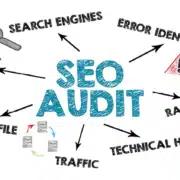Fact or Fiction: Debunking Four SEO Myths
Search engine optimization (SEO) has always been a critical factor in successfully marketing your online presence. A well-optimized website not only attracts potential customers but also signals credibility to search engines like Google, helping you gain a competitive edge. However, as technology advances—especially with AI-driven tools—the world of SEO continues to evolve.
Unfortunately, with this evolution comes considerable misinformation. Let’s set the record straight by debunking four of the most common SEO myths.
Myth #1: SEO Is Dead
The most apparent myth is that SEO is dead and is no longer relevant. As AI tools like ChatGPT and others continue to evolve, many people believe that SEO is dead. While SEO in its traditional form has changed, its core principles remain essential. Today, SEO is less about keyword stuffing and more about delivering an exceptional user experience by prioritizing fast loading times, relevant content, mobile optimization, and clear navigation. Over half of all website traffic comes from organic searches so it’s still vital to ensure your website has a user-friendly website design with strong content and a mobile-friendly design.
Myth #2: Domain Age Affects Ranking
Many believe that older websites automatically rank higher simply due to their history with search engines. While established sites may have had more time to build authority and backlinks, Google does not use domain age as a ranking factor.
If an older website is poorly designed, outdated, or slow, it can actually hurt your SEO. A sleek, modern, user-friendly website will always outperform an older, neglected one. If your website isn’t delivering results, don’t hesitate to invest in a refresh—or even a complete overhaul. A well-optimized website is a long-term asset for your business.
Myth #3: SEO Is a One-Time Fix
SEO is not a “set it and forget it” strategy. As Google updates its algorithms, search trends change, and new technologies emerge, your website must evolve as well.
A successful SEO strategy requires:
- Regular content updates – Fresh, relevant content keeps your site engaging and competitive.
- Ongoing performance monitoring – Analyzing website data helps identify areas for improvement.
- Adaptability – Keeping up with ranking updates, legislative changes, and new optimization strategies.
Think of SEO like maintaining your office: you wouldn’t leave your physical location uncleaned, outdated, or unorganized. Your website—the virtual front door to your business—deserves the same attention.
Myth #4: Mobile Optimization is Optional
If you think mobile optimization is just a “nice-to-have,” think again. Over 53% of all web traffic comes from mobile devices.
Google also uses mobile-first indexing, meaning it primarily evaluates the mobile version of your site when determining rankings. If your website isn’t mobile friendly, you could be losing valuable traffic and potential customers.
A mobile-optimized website should:
- Be responsive and easy to navigate on all screen sizes
- Load quickly on mobile devices
- Offer a seamless experience across desktop and mobile
User experience directly impacts conversions. If visitors struggle to navigate your site on their phones, they’ll leave—and likely won’t come back.
The Bottom Line: SEO Still Matters
SEO isn’t a trend—it’s a vital part of digital marketing that ensures your website stays visible, relevant, and effective. By investing in a well-optimized website with great content and visuals, intuitive navigation, and mobile-friendly design, you can improve user experience and drive long-term business growth.
At Chartwell Agency, we understand the importance of keeping your “virtual front door” easy to find online, looking great and performing well. If you’re not sure where to start, let us help.









